Pickles may offer several nutritional and wellness benefits—including gut support, hydration, and low-calorie flavor—when eaten in moderation.
Pickles are more than a tangy side dish. Depending on the type you choose (fermented or vinegar-based), they can offer probiotics, antioxidants, electrolytes, and essential nutrients like vitamin K. However, pickles are also naturally high in sodium, making portion control essential for heart and overall health.
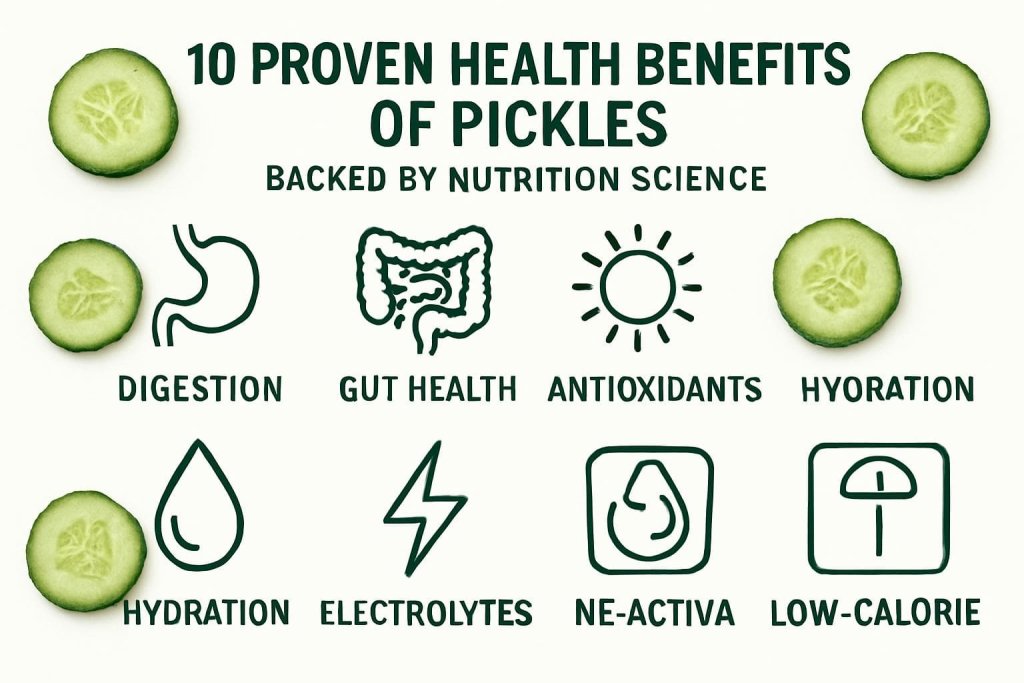
In this guide, you’ll learn how pickles can support digestion, hydration, blood sugar management, and nutrient intake, backed by current nutrition data and evidence from reputable health organizations. You’ll also find precautions, safe-eating tips, and frequently asked questions for everyday wellness.
What Are Pickles? (Overview and Nutrition Profile)
Pickles are vegetables—most commonly cucumbers—preserved in either a saltwater brine or a vinegar solution to extend shelf life and enhance flavor. They are valued for their tangy taste, crisp texture, and versatility in both fermented and non-fermented forms. Understanding how pickles are made is important because their nutritional benefits differ depending on the preparation method.

Fermented Pickles (Naturally Fermented / Brine-Based)
Fermented pickles are made by soaking cucumbers in a salt brine, allowing naturally occurring lactic acid bacteria to break down sugars and produce lactic acid. This fermentation process may create live beneficial microbes, similar to those found in yogurt or kimchi. These versions are typically sold refrigerated and labeled “contains live cultures.”
Vinegar Pickles (Non-Fermented)
Vinegar pickles are preserved using vinegar, salt, and seasonings. They do not undergo fermentation and generally do not contain probiotics. However, they still offer flavor, crunch, and a range of vitamins and minerals. These varieties are commonly shelf-stable.
Both styles offer unique tastes and can support different nutritional goals when incorporated mindfully into a balanced diet.
Nutrition Profile of Pickles (Per 100 g, USDA Data)
Pickles are low in calories and contain small amounts of essential vitamins and minerals. According to USDA FoodData Central, the typical dill pickle provides:
Source: https://fdc.nal.usda.gov
- Calories: ~12 kcal
- Carbohydrates: ~2.4 g (approx. 1.4 g net carbs)
- Fiber: ~1 g
- Protein: ~0.5 g
- Fat: ~0.3 g
- Water: ~94 g
- Sodium: ~700–800 mg (about 30–35% of the recommended daily limit)
- Potassium: ~117 mg
- Calcium: ~57 mg
- Vitamin K: ~17 µg (~14% DV)
- Vitamin C: ~2.3 mg
Key Nutrition Takeaways
- Low calorie: Pickles contribute minimal calories while adding strong flavor.
- High sodium: Most commercial pickles are salty, making moderation essential, especially for people monitoring blood pressure.
- Contains vitamin K: Supports normal blood clotting and bone metabolism.
- Hydrating: High water content helps with fluid intake.
- Fermented versions may contain probiotics, but vinegar-based versions do not.
This nutritional overview helps readers understand how different pickle types fit into balanced eating patterns and what benefits they may offer depending on dietary goals.
10 Proven Health Benefits of Pickles (Backed by Nutrition Science)
Pickles can offer several wellness-supporting benefits, especially when you choose unsweetened or naturally fermented varieties. Below are ten evidence-based advantages, each grounded in current nutrition research and authoritative sources.
1. Low-Calorie Snack That Supports Weight Management
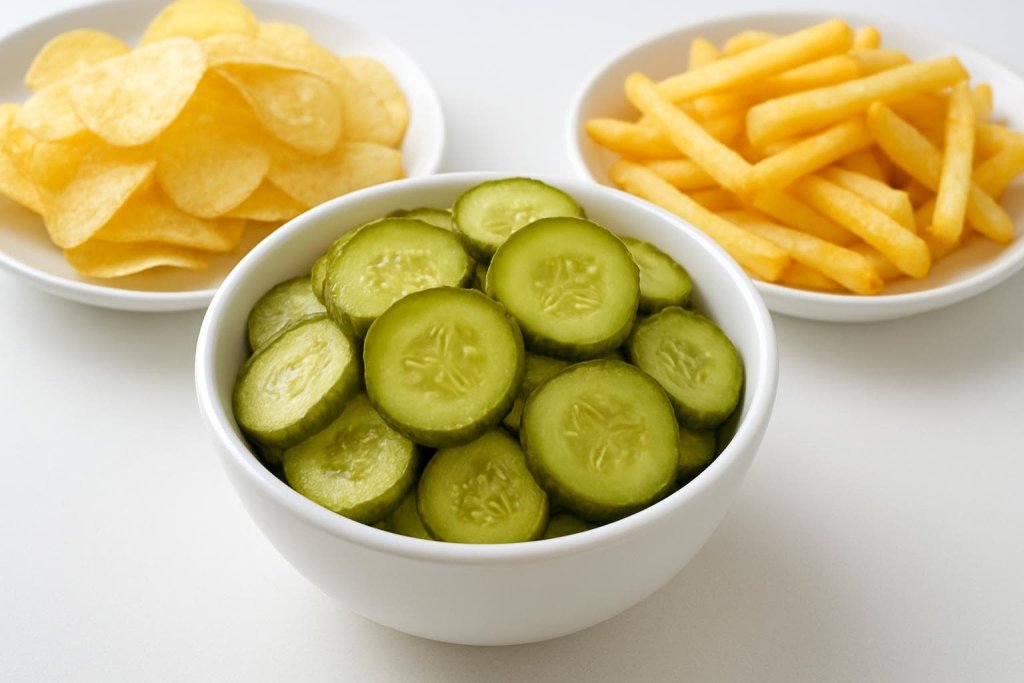
Pickles offer intense flavor with very few calories, making them a practical choice for people looking to maintain or reduce their calorie intake. According to USDA FoodData Central, dill pickles contain approximately 12 calories per 100 g, significantly lower than common snack foods.
Source: https://fdc.nal.usda.gov
Because pickles provide crunch and flavor without added fats, they may help you replace higher-calorie sides such as chips, fries, or creamy dips. This substitution alone may support healthier overall energy balance, especially in calorie-conscious eating patterns.
2. May Support Gut Health (Fermented Pickles)
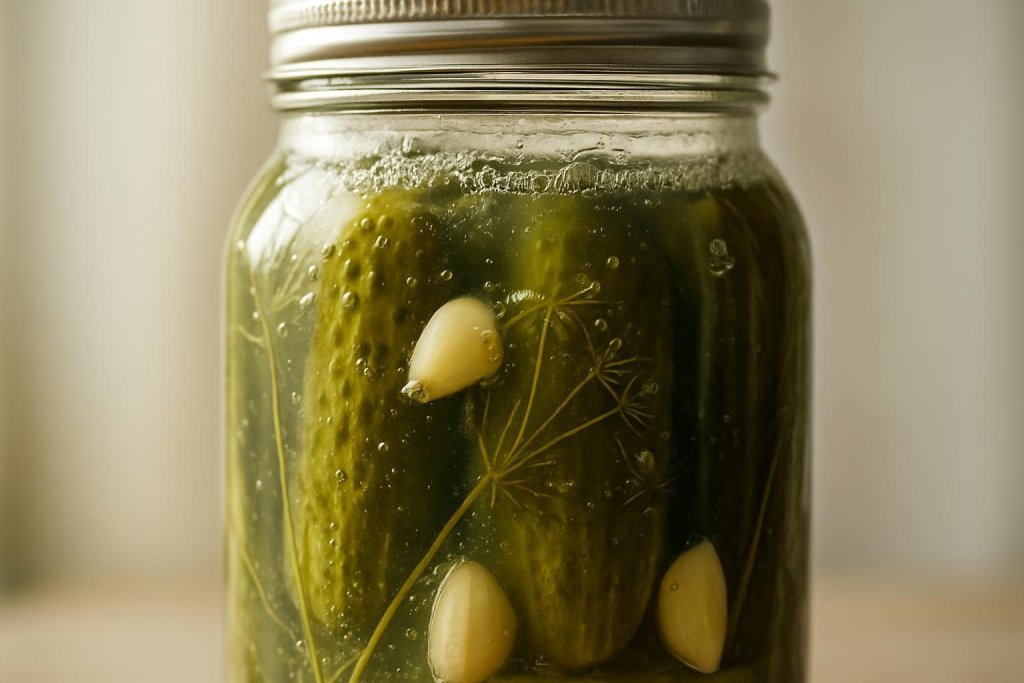
Fermented pickles—those made through a natural brine fermentation process—may contain beneficial lactic acid bacteria, similar to those found in yogurt and other fermented vegetables. These microbes may help support gut microbial balance and overall digestive well-being.
Research published in Cell and summarized by Harvard T.H. Chan School of Public Health notes that fermented foods can increase microbiome diversity and may help support a healthier intestinal environment:
Harvard source: https://www.hsph.harvard.edu/nutritionsource/fermented-foods/
To access these potential benefits, look for labels stating “naturally fermented” or “contains live cultures”, and choose refrigerated jars rather than shelf-stable vinegar pickles.
3. Supports Digestion Through Organic Acids
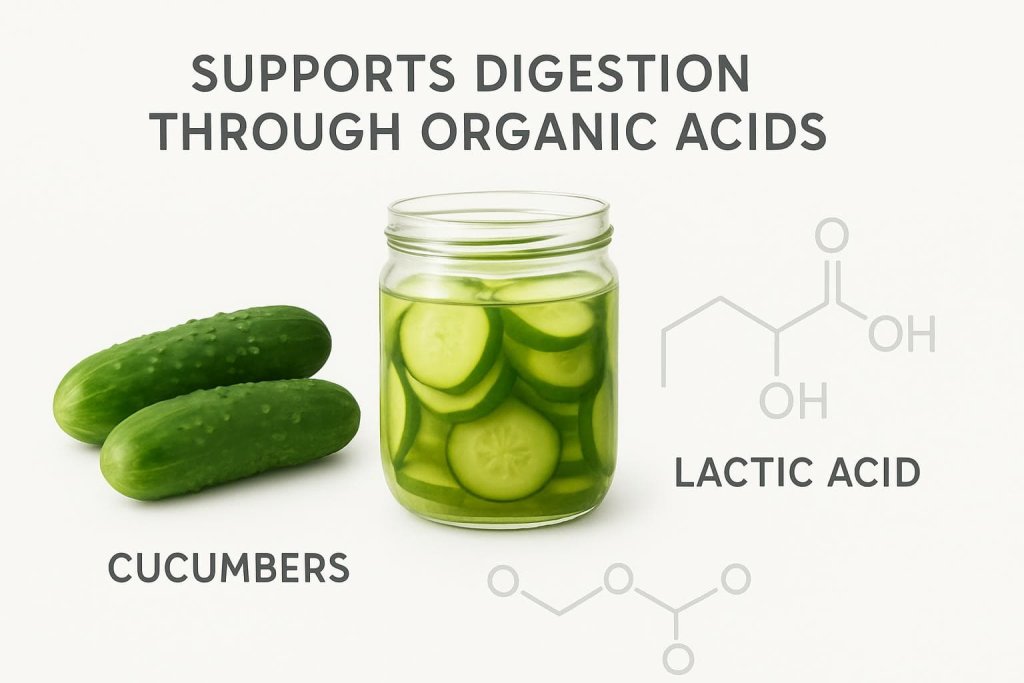
During fermentation, cucumbers produce lactic acid and other organic acids that may support smoother digestion by helping maintain a balanced gut environment. These acids contribute to the sour flavor of fermented pickles and may help the body’s natural digestive processes.
The National Center for Complementary and Integrative Health (NCCIH) notes that fermented foods contain compounds that can support the gut’s natural function and digestive comfort:
NCCIH overview: https://www.nccih.nih.gov/health/probiotics-what-you-need-to-know
4. Provides Vitamin K for Bone and Blood Health

According to the USDA, dill pickles supply vitamin K, an essential nutrient that supports normal blood clotting and bone metabolism. Although pickles are not a leading vitamin K source compared to leafy greens, their contribution adds up when included as part of a varied diet.
USDA vitamin K reference: https://ods.od.nih.gov/factsheets/VitaminK-Consumer/
Pairing pickles with vitamin-K-rich foods such as kale, spinach, or broccoli can help meet daily recommendations.
5. Hydration and Electrolyte Support
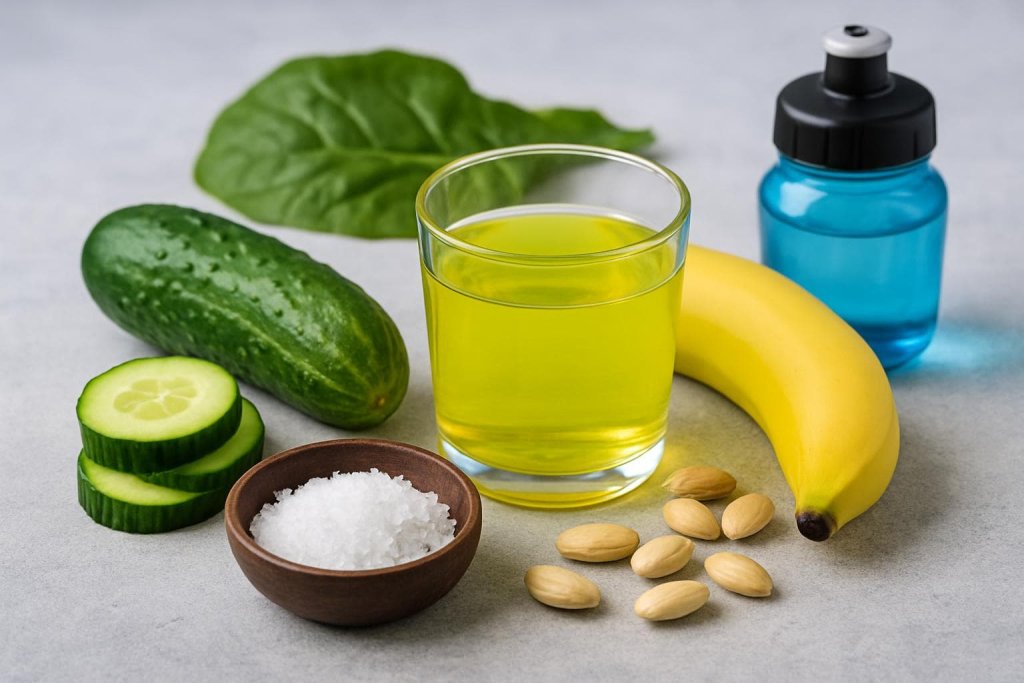
Pickles contain sodium and small amounts of potassium, both of which are electrolytes that help the body maintain proper hydration and fluid balance. Athletes sometimes consume pickle juice before or after physical activity, mainly for its sodium content.
The American College of Sports Medicine (ACSM) notes that electrolytes play a key role in hydration and muscle function during exercise:
ACSM hydration guidance: https://www.acsm.org/read-research/resource-library
However, because pickles are high in sodium, most people should enjoy them in moderation and stay within recommended daily limits. The Centers for Disease Control and Prevention (CDC) advises keeping sodium intake below 2,300 mg per day for most adults:
CDC sodium advice: https://www.cdc.gov/salt/index.htm
6. Natural Antioxidants from Cucumbers and Spices
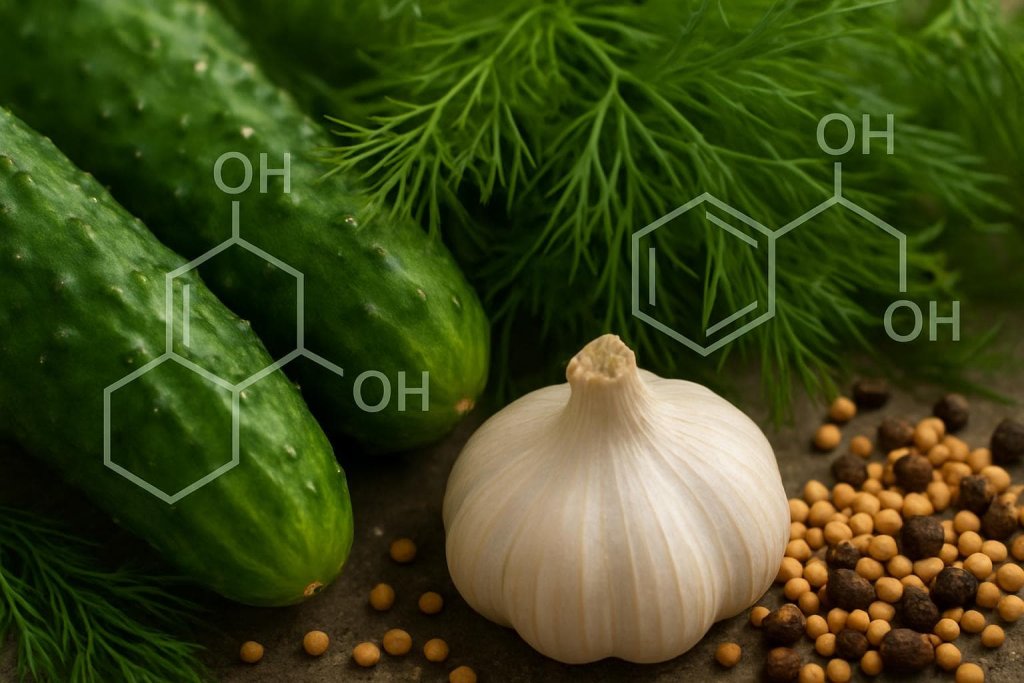
Cucumbers provide vitamin C, polyphenols, and antioxidants, all of which help support the body’s natural defenses against oxidative stress. Seasonings commonly used in pickle brine—such as dill, garlic, and mustard seeds—also add small amounts of plant compounds.
Studies on fermented vegetables (e.g., sauerkraut, kimchi) show that fermentation may increase the bioavailability of antioxidants, offering additional support for cellular health.
Reference: Nutrients Journal review on fermentation and antioxidant activity
https://www.mdpi.com/journal/nutrients
7. May Support Blood Sugar Regulation (Vinegar Pickles)
Vinegar-based pickles contain acetic acid, the main active compound in vinegar. Research summarized by the Harvard T.H. Chan School of Public Health – The Nutrition Source explains that vinegar consumed with meals has shown potential to support modest reductions in post-meal blood glucose levels, particularly in adults at risk for type 2 diabetes.
Source (Harvard Nutrition Source – Vinegar): https://nutritionsource.hsph.harvard.edu/food-features/vinegar/
According to Harvard’s review, acetic acid may work by slowing gastric emptying and influencing the body’s response to carbohydrate digestion, which can contribute to steadier post-meal glucose levels. These findings are based on small clinical studies, and while the results are promising, they should be interpreted with caution.
This effect is not exclusive to pickles—the benefit is linked to vinegar itself, not specifically the pickling process. However, vinegar-based pickles can offer an easy, flavorful way to incorporate small amounts of acetic acid into meals. For best results, choose unsweetened varieties to avoid added sugars that may raise blood glucose.
8. Low-Carb Option for Blood Sugar Awareness
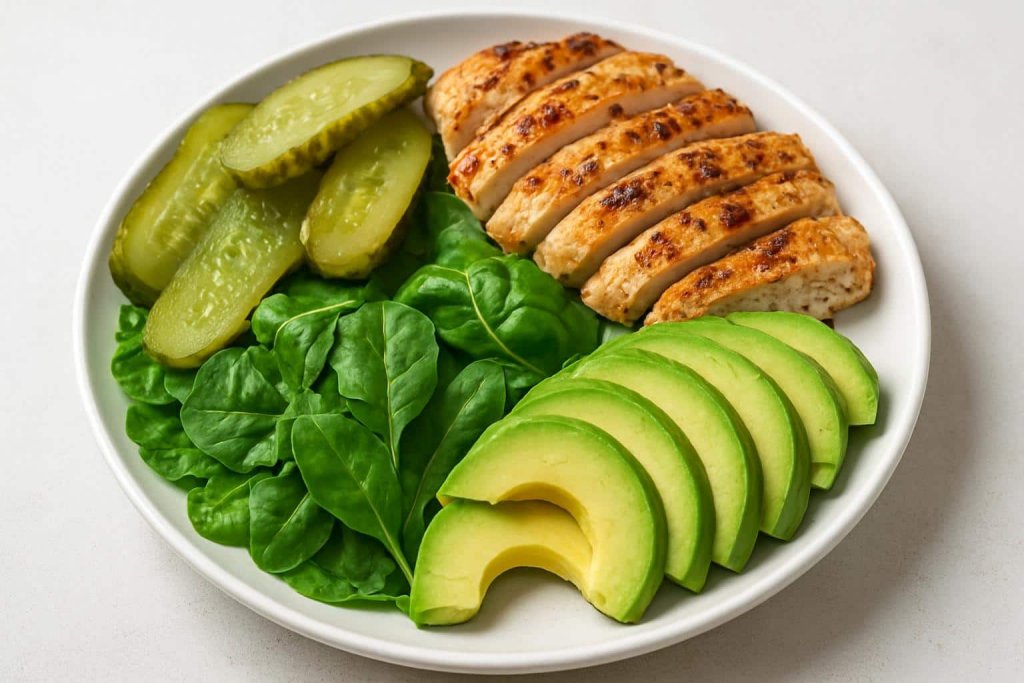
Unsweetened dill pickles are naturally low in carbohydrates, making them a practical choice for people who want to manage their blood sugar levels. Most dill pickle varieties contain only a small amount of naturally occurring sugars, and many provide 1–2 grams of total carbohydrates per serving, depending on the brand and preparation method.
The American Diabetes Association (ADA) explains that non-starchy vegetables and foods with minimal carbohydrates can support more stable post-meal blood glucose levels, especially when replacing higher-sugar or refined carbohydrate snacks.
Updated ADA resource (Understanding Carbs): https://diabetes.org/food-nutrition/understanding-carbs
Because unsweetened dill pickles fall into the non-starchy vegetable category, they may serve as a flavorful, lower-glycemic alternative to sweet snacks or higher-calorie processed foods. However, people monitoring their sodium intake should still consume pickles mindfully, as many varieties are high in salt.
9. Flavor Booster That Helps Reduce Added Sugars and Fats
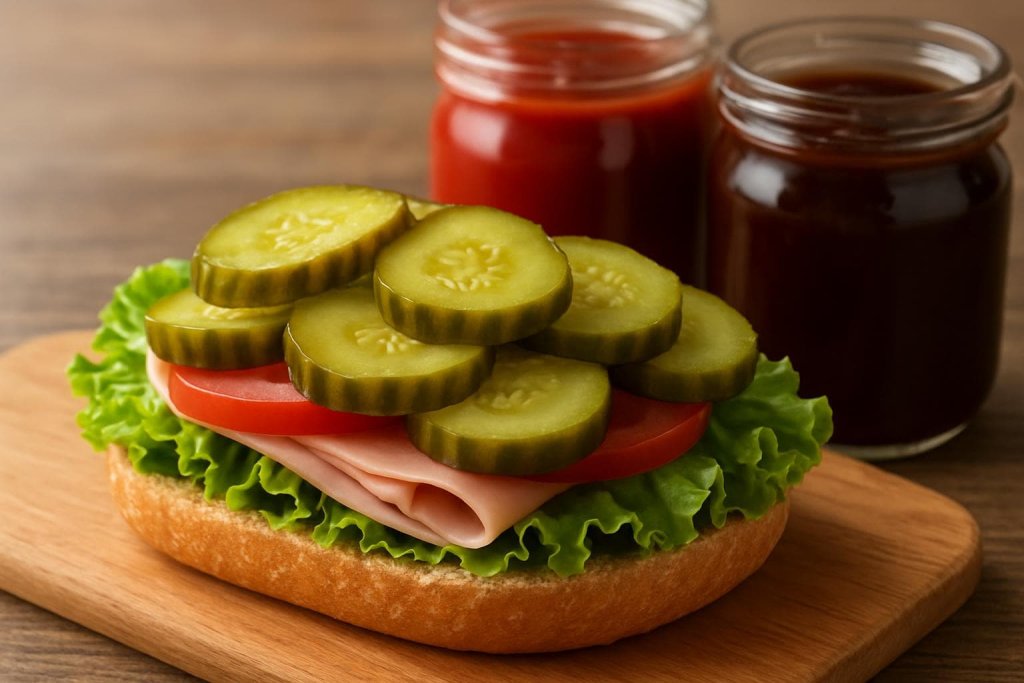
Pickles add intense flavor—salty, sour, tangy—which may help reduce the need for high-calorie sauces or dressings such as mayonnaise, ranch, barbecue sauce, or sugary marinades. By enhancing meals with bold taste, pickles can help support a more balanced eating pattern.
Using pickles in bowls, wraps, and salads may increase satisfaction without adding unnecessary sugars or fats, supporting overall nutrient density.
10. Encourages More Vegetable Consumption
Pickling is not limited to cucumbers. Vegetables such as carrots, onions, beets, peppers, cauliflower, and green beans can all be preserved in a brine or vinegar solution. This variety can help increase overall vegetable intake, an important part of dietary patterns recommended by the U.S. Department of Agriculture (USDA) and Harvard Healthy Eating Plate.
Harvard Healthy Plate: https://www.hsph.harvard.edu/nutritionsource/healthy-eating-plate/
Adding more vegetables—whether fresh or pickled—supports a nutrient-rich eating style.
Possible Side Effects and Precautions
While pickles can be part of a balanced diet, they should be consumed mindfully—especially for individuals monitoring sodium, heart health, digestion, or blood sugar. Below are the key precautions supported by authoritative health organizations.
High Sodium Content (CDC, AHA)
Most commercial pickles contain 700–1,200 mg of sodium per serving, which can significantly contribute to daily sodium intake. The Centers for Disease Control and Prevention (CDC) recommends keeping sodium below 2,300 mg per day, noting that high intake is associated with increased risk of high blood pressure.
CDC sodium guidance: https://www.cdc.gov/salt/index.htm
The American Heart Association (AHA) suggests an even lower ideal limit of 1,500 mg/day, especially for those with hypertension or heart concerns.
AHA sodium recommendations: https://www.heart.org/en/healthy-living/healthy-eating/eat-smart/sodium
Because pickles are preserved in salty brine, moderation is essential.
Heart Disease or Kidney Disease Considerations
Individuals with heart disease, high blood pressure, or kidney disease must be especially cautious with high-sodium foods, including pickles. Excess sodium may worsen fluid retention and strain the cardiovascular and renal systems.
For medical conditions, personalized guidance from a healthcare provider is recommended.
Sugar in Sweet Pickles
Sweet or “bread-and-butter” pickles often contain added sugars that increase total carbohydrates. Excess sugar may impact blood glucose levels, making them less ideal for people monitoring their carbohydrate intake.
The American Diabetes Association advises limiting high-sugar foods to help support stable blood glucose.
ADA carbohydrate guidance: https://diabetes.org/food-nutrition/understanding-carbs
Vinegar Sensitivity (GERD)
Vinegar-based pickles are highly acidic and may trigger acid reflux or heartburn in individuals with GERD or sensitive digestion. The National Institute of Diabetes and Digestive and Kidney Diseases (NIDDK) notes that acidic foods can worsen symptoms in some people with reflux.
NIDDK GERD info: https://www.niddk.nih.gov/health-information/digestive-diseases/acid-reflux-ger-gerd-adults
Histamine Intolerance
Fermented pickles can contain high levels of histamine, which may contribute to symptoms such as flushing, headache, or digestive discomfort in sensitive individuals. Histamines naturally increase during fermentation, similar to sauerkraut, kimchi, and aged cheeses.
Not a Substitute for Medical Treatment
Pickles—fermented or vinegar-based—may support wellness but cannot replace medical care for digestive disorders, blood pressure management, or metabolic concerns. Individuals with health conditions should follow guidance from qualified healthcare professionals.
How to Choose Healthy Pickles
Choosing the right type of pickle can make a significant difference in overall nutritional value. Use the criteria below to select the healthiest options.
1. Look for “Low-Sodium” or “Reduced Sodium”
Some brands offer low-sodium varieties, which align better with CDC and AHA guidelines. These are preferable for heart health and daily sodium balance.
2. Select “No Added Sugar” or Unsweetened Varieties
Avoid sweet pickles or bread-and-butter styles if you want to limit added sugar. Unsweetened dill pickles offer the lowest carbohydrate content.
3. Choose Naturally Fermented Pickles
If your goal is to support gut wellness, look for labels that say:
- “Naturally fermented”
- “Contains live cultures”
These pickles are usually refrigerated and preserved through saltwater brining rather than vinegar.
4. Check for Clean Ingredient Lists
Healthier pickles typically contain:
- Cucumbers
- Water or brine
- Vinegar (for non-fermented styles)
- Salt
- Spices (garlic, dill, mustard seeds)
Try to avoid:
- Artificial dyes
- High-fructose corn syrup
- Excess preservatives
5. Refrigerated vs. Shelf-Stable Pickles
- Refrigerated, naturally fermented pickles offer potential probiotic benefits.
- Shelf-stable vinegar pickles are convenient but usually lack live cultures.
Both can fit into a healthy diet—it depends on your goals.
How to Add Pickles to Your Diet Safely
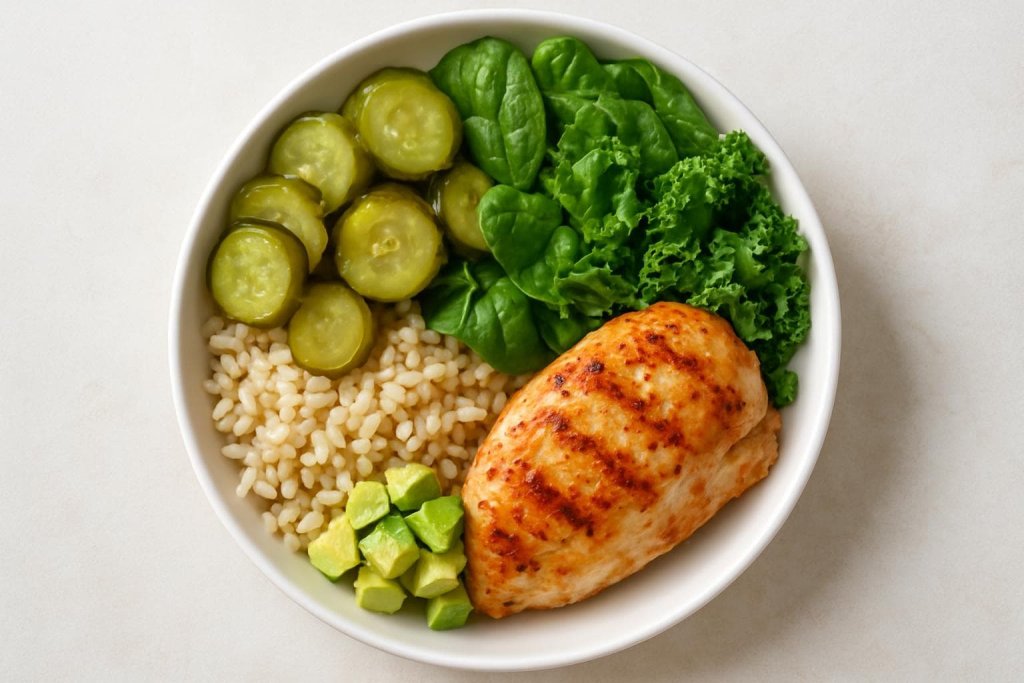
Pickles can enhance meals when used thoughtfully. These guidelines help maximize benefits while managing sodium and acidity.
1. Practice Smart Portion Sizes
Due to sodium levels, many dietitians recommend limiting intake to 1–3 spears per day, depending on your sodium needs.
2. Pair Pickles With High-Potassium Foods
Potassium-rich foods may help balance sodium levels. Consider pairing pickles with:
- Spinach
- Avocado
- Beans
- Sweet potatoes
- Bananas
USDA potassium-rich foods: https://www.nal.usda.gov
3. Add Pickles to Balanced Meals
Pickles add flavor without many calories. Try adding them to:
- Grain bowls
- Salads
- Sandwiches or wraps
- Tuna, egg, or chicken salad
- Charcuterie boards
4. Use Vinegar vs. Fermented Pickles Intentionally
- Fermented pickles may support gut microbial diversity.
- Vinegar pickles add acetic acid, which may help support modest post-meal blood sugar regulation.
5. Stay Hydrated
Because pickles can be salty, drinking water helps balance fluid levels—especially for people sensitive to sodium.
6. Consider Sodium Needs if Exercising
Athletes losing electrolytes through sweat may include small portions of pickles or pickle juice to replenish sodium—but always within overall hydration guidelines.
FAQs About Pickles and Health
1. Are pickles good for gut health?
Fermented pickles may offer beneficial bacteria that support gut microbial balance, but vinegar pickles do not contain live cultures.
2. Are pickles safe for people with high blood pressure?
Most pickles are high in sodium, so individuals with hypertension should choose low-sodium varieties or limit intake, following AHA guidelines.
3. Do pickles contain probiotics?
Only naturally fermented pickles may contain probiotics. Shelf-stable vinegar pickles almost never do.
4. Can pickles help with blood sugar?
Vinegar-based pickles contain acetic acid, which research shows may support modest reductions in post-meal blood sugar when eaten with carbohydrates.
5. Are sweet pickles healthy?
Sweet pickles contain added sugar and are less suitable for blood sugar–focused eating patterns.
6. Can pickles cause heartburn?
Yes, vinegar-based pickles may worsen symptoms in individuals with GERD or acid reflux.
7. How many pickles can I eat per day?
Due to sodium content, most people should limit intake to 1–3 spears, depending on individual sodium needs and health conditions.
Conclusion
Pickles can be a flavorful, low-calorie addition to a balanced diet. Fermented pickles may support gut microbial diversity, while vinegar-based pickles provide acidity and a satisfying tang. However, because pickles are naturally high in sodium and sometimes added sugars, mindful selection and moderation are essential—especially for individuals managing blood pressure, diabetes, GERD, or kidney health.
Choose low-sodium, unsweetened, naturally fermented varieties when possible and pair them with nutrient-dense foods to support overall wellness.
This content is for informational purposes only and not medical advice.
References:
- CDC – Sodium and Health
https://www.cdc.gov/salt/about/index.html - Harvard T.H. Chan School of Public Health – The Microbiome (Fermented Foods & Gut Health)
https://nutritionsource.hsph.harvard.edu/microbiome/ - Harvard T.H. Chan School of Public Health – Vinegar and Blood Sugar
https://nutritionsource.hsph.harvard.edu/food-features/vinegar/ - American Diabetes Association – Understanding Carbohydrates
https://diabetes.org/food-nutrition/understanding-carbs - NIDDK – GERD (Acid Reflux) Symptoms & Causes
https://www.niddk.nih.gov/health-information/digestive-diseases/acid-reflux-ger-gerd-adults/symptoms-causes - USDA FoodData Central – Dill Pickle Nutrition Profile
https://fdc.nal.usda.gov/
